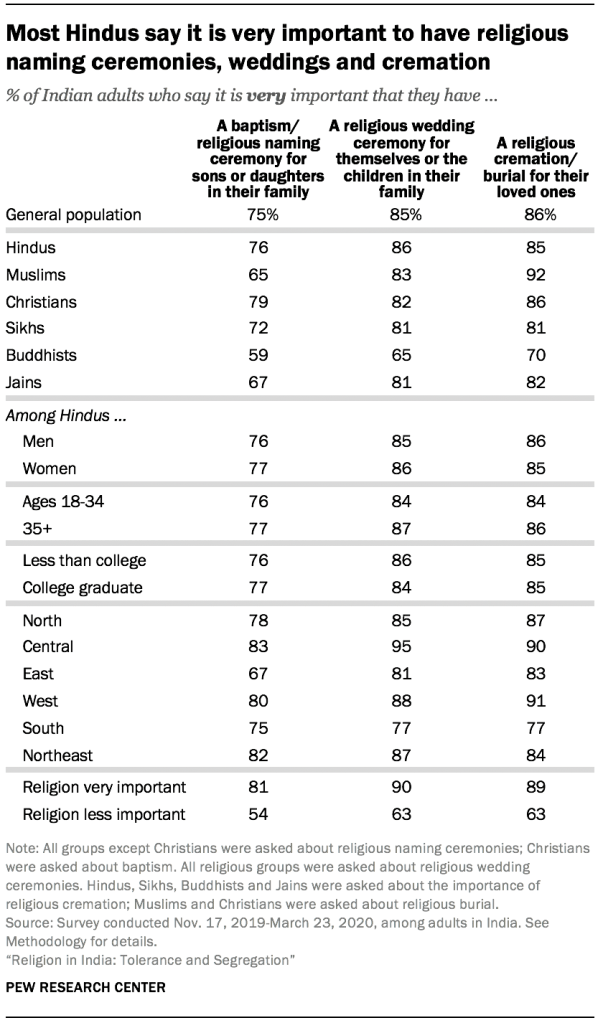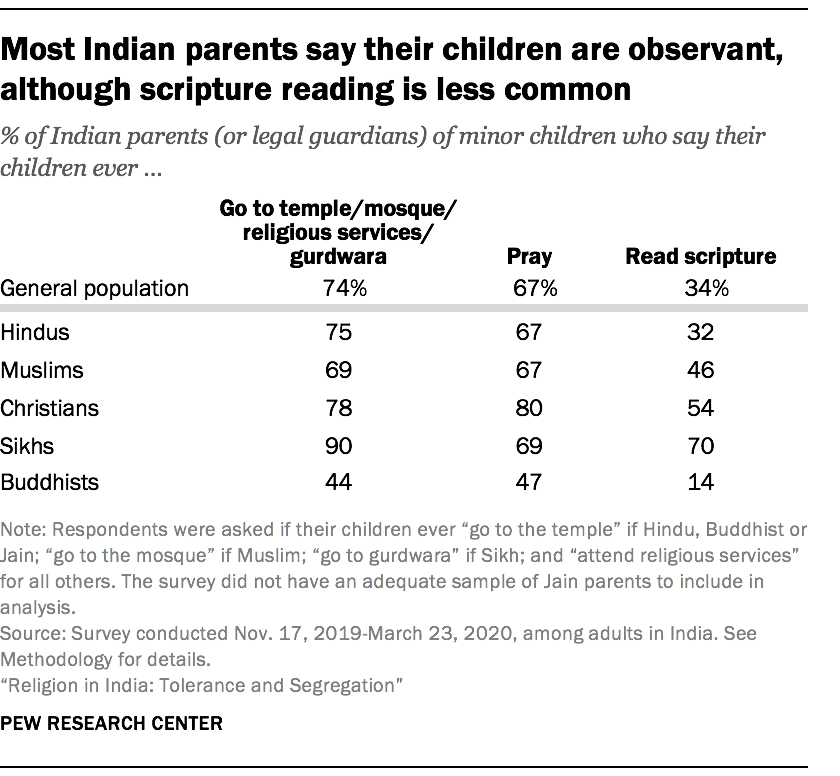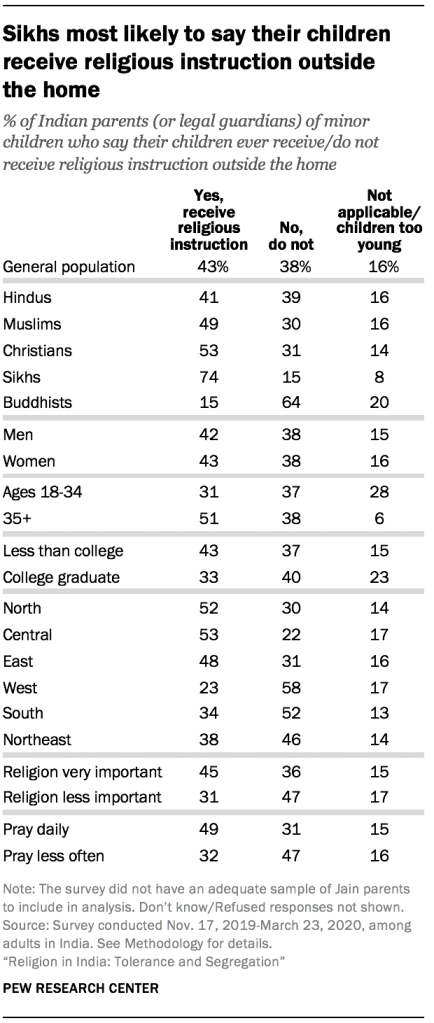Indians value marking important life events through religious ceremonies. Across all major religious groups, most people say it is very important to have a religious naming ceremony (or baptism) for their children, a religious wedding ceremony for themselves or their children, and a religious cremation (or burial) for their loved ones.
Most parents of children under the age of 18 say religion has a role in their children’s upbringing. Indian parents generally say their children visit houses of worship (whether temples, mosques, gurdwaras or churches), and most say their children pray. For example, two-thirds of both Hindu and Muslim parents say their children pray.
But the survey also suggests that formal religious education is not a central part of how religious tradition is passed on to children in India, at least not for most religious groups. Fewer than half of Indian parents say their children receive religious instruction outside the home, suggesting that religious traditions and beliefs are mostly passed down within families.
Sikhs are an exception to this pattern: About three-quarters of Sikhs (74%) say their children receive religious education outside the home, which is higher than any other religious group in India. Sikhs also are especially likely to say their children are engaged in their religious traditions. Nine-in-ten Sikh parents say their children go to the gurdwara (90%), compared with 74% of Indian parents overall who say their children go to a house of worship. And a majority of Sikh parents (70%) say their children read Sikh scripture, compared with one-third of all Indian parents (34%) who say their children read holy texts associated with their religious tradition.
Sikhs also value passing on a uniquely Sikh tradition to their community’s children – keeping their hair uncut. A majority of Sikhs (76%), including both men and women, say they keep their own hair long (see Chapter 9), and 67% say it is very important that children in their family keep their hair long. Even among Sikhs who don’t follow the practice of keeping their own hair long, nearly half (49%) say it is very important that children in the family keep their hair long, indicating the close association of this tradition with Sikh culture.
Indians value marking lifecycle events with religious rituals

The survey asked respondents how important it is to them to have religious ceremonies for lifecycle events – specifically, a religious naming ceremony or baptism for their family’s children, a religious wedding for themselves or for the children in their family, and a religious cremation or burial for loved ones. Most Indians in all six major religious groups consider it very important to perform each of these three ceremonies.
Among Hindus, three-quarters or more say it is very important to have a religious naming ceremony (76%), a religious wedding (86%) and a religious cremation (85%). Sikhs answer similarly, as do Christians (Christians were asked about baptism and a religious burial). Muslims are slightly less likely than Hindus to say a religious naming ceremony is very important (65%), but a near-universal share value a religious burial (92%).
Buddhists are less likely to place high priority on these ceremonies, but still, most Buddhists say it is very important to have a religious naming ceremony (59%), religious wedding (65%) and religious cremation (70%) for their loved ones.
Hindus across different genders, age groups, education levels and regions generally agree on the importance of these ceremonies. But Hindus who say religion is very important in their lives are more likely than other Hindus to say these ceremonies are very important to them.
Most Indian parents say they are raising their children in a religion

Virtually all Indian parents (or legal guardians) of minor children are bringing up children in a religious tradition; bringing up children with no religion is exceedingly rare in India.
Given that interreligious marriage is very uncommon in India (see Chapter 3), it stands to reason that Indian parents nearly universally say they are bringing up their children in the same religion as their own (99%).
In addition, a majority of Indian parents say their children visit a house of worship associated with their faith (74%) and that their children pray (67%). Sikh parents are especially likely to say their children go to the gurdwara (90%). (Fieldwork for this survey was completed before the country’s first major lockdown due to COVID-19.)
A smaller share of Indian parents say their children read scripture (34%). Sikhs are, again, more likely than members of other religious groups to say their children do this (70%). Among Hindu parents, those who live in extended family households (joint families) are more likely than those who live in nuclear families to say their children read scripture (38% vs. 23%).19
Fewer Buddhist parents than parents in other religious groups say their children ever go to temple (44%), pray (47%) or read scripture (14%).
Overall, younger and more highly educated parents are less likely than older and less-educated parents to say their children do religious activities. For example, among Hindus, 76% of those without a college education say their children go to temple, compared with 61% among those with a college degree.
Fewer than half of Indian parents say their children receive religious instruction outside the home

Even though most parents of minor children say their children pray and visit houses of worship, fewer say their children receive religious instruction outside the home, suggesting that in India, children learn about religion primarily at home.
Overall, 43% of Indian parents say their children ever receive religious instruction outside the home. A slightly smaller share explicitly say their children do not receive such instruction (38%); some parents responded that the question does not apply to them or that their children are too young (16%).
Sikhs are the most likely of the religious groups surveyed to say their children receive religious instruction outside the home (74%). Meanwhile, about half of Muslim (49%) and Christian (53%) parents say their children take religious classes. Roughly four-in-ten Hindu parents (41%) say their children receive formal instruction in religion, while fewer Buddhist parents (15%) say this.
Younger parents (under age 35) and those who are highly educated are less likely to say their children receive religious instruction outside the home. For example, roughly one-third of college-educated Hindu parents (32%) send their children to formal classes in religion, compared with 42% of those who have less education.
Hindu parents who say religion is very important to their lives and who pray daily are more likely than less religious Hindus to send their children for formal instruction in religion. But this pattern is less sharp among other religious groups, suggesting that formal instruction in religion may not be an important indicator of religious commitment for families of different religious backgrounds. For example, 15% of highly religious Buddhists and 12% of less religious Buddhists say their children receive religious instruction outside the home.
Parents in the West (23%) and South (34%) of India are generally less likely to send their children for formal religious instruction than parents in the Northern (52%), Central (53%) and Eastern (48%) regions. A majority of Muslim parents in the Northern (63%) and Central (60%) parts of the country say their children receive formal religious education. Meanwhile, among Christians, two-thirds of parents in the Northeast (68%) send their children for religious instruction.
Vast majority of Sikhs say it is very important that their children keep their hair long

Most Sikhs in India (76%) keep their hair long, a practice closely associated with Sikh religion and culture. When asked how important it is for the children in their family to keep their hair long, two-thirds of Sikhs (67%) say it is very important.
Sikhs across different demographic backgrounds generally say it is very important that children in their family keep their hair uncut. More religious Sikhs are more likely to say this is crucial: For example, among those who pray daily, three-in-four Sikhs place high value on the tradition. Still, 62% of those who pray less often also say it is very important that children in the family keep their hair long, indicating the strong association of this tradition with Sikh identity beyond religious observance.
Similarly, Sikhs who themselves keep their hair long are more likely than Sikhs who cut their hair to say it is very important that children in their family follow the same Sikh tradition. Still, even among Sikhs who cut their own hair, nearly half (49%) say it is very important that children keep their hair long.
Sikh attitudes on passing this tradition down to children also are linked to politics. Specifically, Sikhs who say they voted for the Bharatiya Janata Party (BJP) in the 2019 parliamentary elections are much more likely than those who voted for the Indian National Congress (INC) to say Sikh children should keep their hair uncut (81% vs. 56%). Among those who voted for Shiromani Akali Dal, a Sikh party, 65% say it is very important that children in their family keep their hair uncut.20
Caste also is linked with attitudes on this issue. Fully 76% of General Category Sikhs say it is very important to keep children’s hair long, compared with 59% of those belonging to lower castes.




